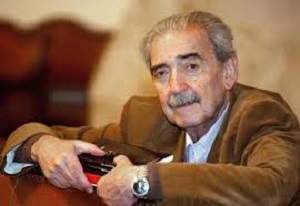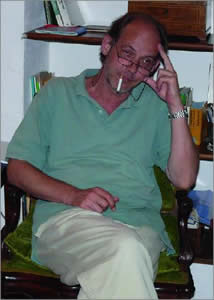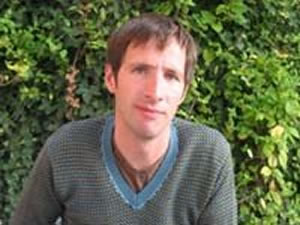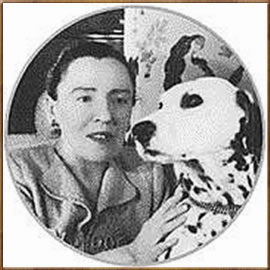De Nederlandse dichter Erik Lindner werd geboren op 3 mei 1968 in Den Haag. Zie ook alle tags voor Erik Lindner op dit blog.
Tijdelijke halte
Is dit een stad? Huizen en trams
raken los van elkaar de straat.
Dit is een luifel. Een marmeren zuil.
Een kapsalon die nog ruikt naar jus.
Hier is een zwembad. Een glazen pui.
Een winkelstraat waar het verkeer niet past.
Ze bukt niet als ze door het kikkerbad waadt
en met haar vingers de kruin van het kind aanraakt.
Bij elke beweging aan het fotokopieerapparaat
schiet de schuifdeur van de supermarkt open.
Zo verklaart een passant wat passeren is:
een stad die je verlaat terwijl je er blijft.
De tramontane
Voor de kust rust de duiker in zijn verhaal
en tekent kaal de bergwand aan het strand.
De wind snijdt het verhaal en slijpt en slijpt
bladeren van de platanen – het raamkozijn.
Ik kwam met de wind mee voor dit verhaal.
De reis vertelde een man liep over de berg
en het verhaal loopt dood op zee. De wind
speelt heer op zijn graf. En de duiker raakt
bekneld tussen het steen, de helpers duiken
op en de wind verplettert de deining de zee.
De duiker schildert windvlagen voor de kust.
De bergwand bloeit. En het graf is een trede
naar het koraal in een spelonk op de bodem
boven de kleurgravure van het bloemgordijn.
Kranten blijven liggen
Kranten blijven liggen als de tram niet rijdt
geen ziel staat op om zijn plaats af te staan
fietsbanden glijden door over de rails
luchtbellen stijgen op uit het water
de man hier voor me leunt met zijn krant
haaks steunt de elleboog
het gewicht waarmee hij zit
de bewuste houding van zijn hand
het witte hondje dat rust op zijn sandaal
die twee dames op het perron
hun blauwe jassen gelijk
hun bruine koffers gelijk
hun haren permanent grijs
hun voeten net niet bij de grond
alleen nog een slapende soldaat
op station Kruiningen-Yerseke
mist de bus naar de pont
en de pont vaart af
en de soldaat mist
zijn plunjezak.
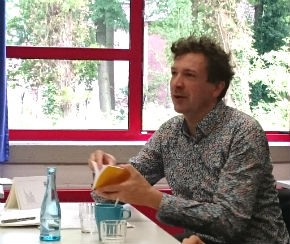
Erik Lindner (Den Haag, 3 mei 1968)
De Duits-Israëlische dichter en schrijver Jehuda Amichai werd op 3 mei 1924 geboren in Würzburg. Zie ook alle tags voor Jehuda Amichai op dit blog.
Een raad voor de goede liefde
Een raad voor de goede liefde: bemin niet
de verren. Neem van de dichtbijen,
zoals je een goed huis bouwt van stenen die daar al lagen,
die geleden hebben in de kou, en in de hitte van de zon zijn geblakerd.
Neem haar met de gouden krans
om haar donkere pupil heen, haar die
een zekere weet heeft van je dood. Bemin ook
in het verwoeste, als de honing
in het karkas van Samsons leeuw.
En een raad voor de slechte liefde: maak,
met de liefde die je overhoudt van de vorige
een nieuwe vrouw, en maak
met wat je daarvan overhoudt
een nieuwe liefde,
tot je niets meer over hebt.
Tweede ontmoeting met vader
Ik kwam mijn vader weer tegen in café ‘Atara’.
Deze keer was hij al dood. De avond buiten
mengde vergeet met herinner, zoals mijn moeder
die warm met koud mengde in het bad.
Mijn vader was niet veranderd. Maar café ‘Atara’
was opgeknapt en veranderd. Ik zei: ‘Gelukkig is hij
die een bakkerij heeft bij zijn café,
want dan kun je daar naar binnen roepen: nóg meer taart,
nóg meer zoetigheid, brengen, brengen!’
Gelukkig is hij wiens dode vader bij hem is
zodat je hem altijd kunt roepen.
O, die eeuwige kinderkreet
‘Ik wil, ik wil!’
Totdat hij verandert in het geschreeuw van gewonden.
O mijn vader, voertuig van mijn leven, ik wil
met je meerijden, neem me een eindje mee,
zet me maar af bij mijn huis
en ga dan alleen verder.
We gingen weg. Er zat nog een man in de hoek
en hij miste een hand.
(Bij de vorige ontmoeting had hij beide handen nog.)
En hij dronk koffie en zette het kopje neer,
en at gebak en legde de vork neer
en bladerde in het geïllustreerde tijdschrift en legde het neer
en legde zijn ene hand op het tijdschrift
en legde zich erbij neer en rustte.
Vertaald door Tamir Herzberg
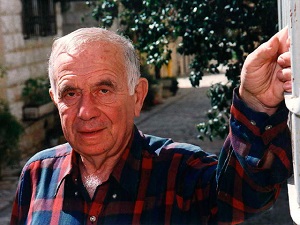
Jehuda Amichai (3 mei 1924 – 22 september 2000)
De Belgische dichter en schrijver Johan de Boose werd geboren in Gent op 3 mei 1962. Zie ook alle tags voor Johan de Boose op dit blog.
Ik ben een reis, ik slijt
Ik ben een reis, ik slijt
mezelf in deze cel.
Hier is geen oceaan, ofschoon zij weent
vlakbij, geen trein, die ginder klaagt,
geen haast, ofschoon ik ben een reis:
de sleepstap, ja, het ijsberen, nog meer,
en het onstuitbaar wandelen,
nog verder, over steppen, over de rivier
en waar de kinderstemmen galmen
in de sneeuw.
Hier sta ik stil, maar ik schiet voort.
Vijf gedichten voor Marina Tsvetajeva
Insomnia
Ik huil niet, nee, ik jaag, ik nijg
naar jou in elk gebaar, gevaarlijk
nijg ik naar de hoogte die je won
en naar de kloof waarin je slapend
sprong. Hoe meer je wandelt in je slaap,
des te slapelozer nijg ik naar een slaap
met jou, waarin ik val als van een hoge vlucht
op steen. Ik nijg met stilte naar de holte
van je stem, met dorst naar de gewijde bron
die uit je lenden welt. Met handen nijg ik
naar de welving van je huid, met bloed
naar bloed, met aders naar de weldaad
van het mes. Ik huil niet, nee, ik vloei
omhoog, stroom langzaam in je droog.
Tijloosheid
Je zeilt de aarde rond alsof ik water was waarmee je enkel paart
als je verdrinkt. Zoveel koloriet, zoveel gevaar, zoveel vernieling
naakt. Zo trek je Rome binnen, alsof je plassen gaat, te voet
en zingend en sacraal, terwijl ik langzaam in mijn woorden
overstroom en in de natte naden van je schaduw klauw:
heb ik je ooit gedroomd of was je dood toen je aan mij verscheen,
nomade tussen tuin en oceaan, geliefde tussen eeuwigheden
leugens? Of was ik zelf gelogen, huurder van de hunker, doder
dan ik kan? Ik bid tot je versteende engelhaar, bewoon
de stofzuil van Sixtijnse tuinen, Rome binnen handbereik. Zo
gaan we samen heen in asblauw licht, in marmermist.
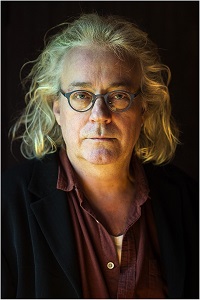
Johan de Boose (Gent, 3 mei 1962)
De Vlaamse dichter en schrijver Paul Bogaert werd geboren in Brussel op 3 mei 1968. Zie ook alle tags voor Paul Bogaert op dit blog.
Waarschuwing
Raak niets aan. Laat het beest
in u voor wat het is.
Waag u nimmer op het ijs
en houd u op de vlakte.
Houd afstand. Let op
uw woorden (megaton, testosteron).
Keer terug. Houd alles voor u zelf
als in een medaillon verpakt.
Gesteld dat u toch verder gaat:
Blijf te allen tijde sceptisch.
Want wie een geschiedenis vertelt,
weerlegt haar en beschaamt haar.
Circulaire systemen
Als men bovengronds de krachten
in het spel indringend voelt,
hoe groot wordt dan het buikgebied?
Stel dat u bewogen wordt en dan steeds meer
tot u mij ziet als doof en gevaarlijk
in mijzelf gekeerd. Ook u herhaalt uw angsten
dan in stop! stop! stop! stop nu!
Niemand echter krijgt dat vertaald
naar later, slechte vrienden, speeltuintuig
waaraan waarin men zich bezeert.
Men komt erop als men een afstand neemt
en niet van rotondetanden schrikt.
Het punt is dan alert te zijn
– man waant zich snel een eigenaar –
– vrouw wordt al gauw onpasselijk –
– voortdurend volgplezier –
want de wand is superdun
tussen een eilandrand (indringend, geneeskrachtig)
en een refrein (onvergetelijk, klevend).
Doodsgevaar maakt zenuwachtig.
Je herinnert je het zweet en de sfeer
Je herinnert je het zweet en de sfeer
en je schrikt van het beeldmateriaal.
De adrenaline die weg is,
de leemte die opzwelt en dan
achterwaarts en baxterachtig
uitlekt in gêne.
Wat je wist, krijg je terug
als een kus: ongevraagd hoogsteigen
negatief startkapitaal.
Dat is dus het verschil!

Paul Bogaert (Brussel, 3 mei 1968)
De Franse schrijver en filmmaker Marc Dugain werd geboren op 3 mei 1957 in Senegal, waar zijn vader werkzaam was.Zie ook alle tags voor Marc Dugain op dit blog.
Uit: Ils vont tuer Robert Kennedy
« A soixante-deux ans, au printemps 2016, j’ai donné ma démission de mon poste de professeur d’histoire contemporaine de l’université de Colombie-Britannique. J’allais désormais assister dans les mois à venir à la nomination d’un faiseur ébouriffé comme candidat du parti républicain à l’élection présidentielle. J’étais intrigué de savoir si le peuple américain allait ou non résister à la tentation populiste d’élire un escroc de l’image. L’idée de voir l’appareil de renseignement couplé aux géants de numérique aux mains de ce bouffon qui, tombé dans un fromage, en avait mangé des milliers de fois son poids, m’épouvantait. Même si j’aurai préféré Sanders, voir comme solution de rechange une femme accéder à la maison blanche me paraissait rassurant. La dynastie Clinton, parfois trouble, n’avait pas nui à la planète comme celle des Bush qui a fini par installer au plus haut de l’État la marionnette de Dick Cheney, le ventriloque au cœur transplanté, l’inoubliable pourfendeur du mal, George W. Bush, le fils prodigue à qui il a manqué certainement un quart d’heure de cuisson à la naissance et dont le seul héritage est le cancer islamique.
(…)
Il se tut brutalement, but une gorgée de bière, esquissa un demi-sourire.
“Qui aurait pu imaginer à cette époque qu’un jour un président des États-Unis pourrait être élu avec l’aide du président de la Russie ? Ces deux-là vont nous mettre sous la cloche du mensonge éhonté. Vous savez que Trump a un hôtel en bord de mer ici, en Irlande, et qu’il voulait construire un mur de cinq mètres de haut tout autour pour se prémunir de la montée des eaux à la suite du réchauffement climatique ? Les écologistes ont eu raison de son projet. Pour l’instant…”
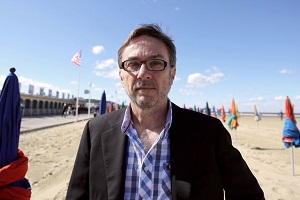
Marc Dugain (Senegal, 3 mei 1957)
De Britse schrijver en komiek Ben Elton werd geboren in Londen op 3 mei 1959. Zie ook alle tags voor Ben Elton op dit blog.
Uit: Gasping
“Act One
Scene one
The executive boardroom of Lockheart Holdings. A power office with large panoramic windows. A strategy meeting is in progress, with graphs and chart. PHILIP and SANDY, two top young execs, are pitching to Sir Chiffley Lockheart, the CHIEF
PHILIP And so, Chief, as you can see, all divisions are way way ahead of seasonal predictions. Look, (He takes a graph.) this is my biggest graph and Peter Profit is way way off the right hand corner . . . I’ve had to glue two together . . . (He proudly folds it out.) Well, obviously I didn’t do it. I had some of my people do it. Anyway, whoever did it, the results, as I think you’ll agree, are impressive. Our corporate hem-line is showing off plenty of stunning thigh. If this keeps up much longer we’re going to have to move into a very much bigger pair of corporate trousers. Possibly Switzerland.
CHIEF (slightly confused by Philip’s language) Hmm, yes, can I just get this clear, Philip. We’re making money? Is that what you’re trying to say?
PHILIP Senior money, Chief. If God wanted to buy into Lockheart stock, he’d have to think twice and talk to his people.
CHIEF ‘Good. Good, at least I think good. So, taking a broad view, Philip, charts and presentation rubbish aside, what’s your personal gut reaction?
PHILIP (thoughtfully pacing) Well, Chief, I would have to say, that I am very excited. In fact I have said it, I said it to my people only this morning, ‘People,’ I said, ‘I am very excited,’ and they know I don’t mince about the bush. But it isn’t just me, Chief, the sales task force is very excited. The boys in corporate raiding are very excited. The market strike unit damage control spin doctors are very excited. Above all, Chief, you should be excited . . . Sir Chiffley Lockheart should feel like a twelve-year-old who’s just discovered it’s not only for pissing.”

Ben Elton (Londen, 3 mei 1959)
Scene uit een opvoering in Brisbane, 2014
De Duitse schrijver Klaus Modick werd geboren in Oldenburg op 3 mei 1951. Zie ook alle tags voor Klaus Modick op dit blog.
Uit: Klack
“Im Westen ist die Luft wieder rein, ausgewaschen die bleierne Schwüle. Die regenschwere Schleppe des Sommergewitters zieht letzte Wolkenfetzen nach Osten. Verspätete Böen kräuseln die Pfützen, auf denen die Abendsonne glüht. Auf der Terrasse Tontrümmer, rostrote Scherben, handtellergroß und fingernagelklein. Der Sturm hat Ziegel vom Dach gerissen. Von unten ist nichts zu erkennen; erst auf dem Speicher zeigt sich der Schaden. Damit hier ein Dachdecker arbeiten kann, muss das Gerümpel unter der Schräge beiseitegeräumt werden – ramponierte Möbel, kaputte Koffer, Kisten und Kartons, die schon manchen Umzug mitgemacht haben, nie ausgepackt und selbst bei Sperrmüllabfuhren vergessen.
Durchs Loch im Dach ist Regenwasser eingedrungen, hat einen der mürben Kartons so durchweicht, dass er beim Verschieben auseinanderreißt. Bücher rutschen auf die Dielen, Algebra II, Der Lederstrumpf, Physik Mittelstufe, Der Schatz im Silbersee, Der Große Diercke-Weltatlas und Der kleine Stowasser, eine Handvoll Reclamhefte, Der Schimmelreiter, Don Carlos, Die Judenbuche und Kleider machen Leute. Im Sonnenlicht, das durch die Luke fällt, tanzt Staub, riecht wie Kreide, wie Schule, und die dunklen Spalten zwischen den Fußbodendielen sind Linien in Schreibheften. Eine klamme Plastiktüte, Kaufhaus Kepa – Das Paradies der Dame, voll mit Muscheln und Kieselsteinen, brackig müffelnde Relikte heller Nordseesommer. Fußballschuhe ohne Schnürbänder, Grasreste schimmeln zwischen den Stollen. Fahrradflickzeug. Eine Wasserpistole aus rotem Plastik. Der Abzug klemmt. Verrostete Schlittschuhe. Schienenstücke einer Modelleisenbahn Märklin.
Ein kleiner Karton Leibniz-Keks nach alter Traditionin thermoplastischerSteifpackung konserviert zwei Faller-Häuschen,Stellwerk und alpenländischer Bergbauernhof. EineBlechdoseGlobol tötet Motten und Mottenbrut, darinBakelitpanzer,Plastiksoldaten, Wikingautos. Ein luftloserLederfußball, in sich selbst versunken wie ein Schrumpfkopf aus Kannibalien.
Noch eine Plastikpistole, in deren Innerem es klötert. Erbsen. Die Schulflure liegen voller Erbsen. Ein Lehrer sagt mit saurem Gesicht: ihr wisst ja gar nicht, was Hunger ist, und Erbsenpistolen werden auf dem Schulgelände verboten. Zwei Tischtennisschläger mit abgeschabten Gumminoppen. Ein Schuhkarton Salamander Knabensandalen Hopps, zusammengehalten von brüchigen Einweckgummis. Hopps?“

Klaus Modick (Oldenburg, 3 mei 1951)
Cover
De Franse dichteres en schrijfster Agnès Desarthe werd geboren op 3 mei 1966 in Parijs. Zie ook alle tags voor Agnès Desarthe op dit blog.
Uit: Je ne t’aime pas, Paulus
« J’aimerais comprendre un jour pourquoi les parents se disputent. Parce qu’il n’y a pas que les miens. Tous les parents c’est pareil. J’ai fait un sondage en classe. Quand on regarde les albums avec les photos en noir et blanc, ils sont tout mignons, tout gentils, et des fois on retrouve une vieille lettre d’amour entre les pages collées. Qu’est ce qui fait que dix ans, douze ans, quinze ans plus tard ils ne peuvent plus se voir en peinture? Est-ce que c’est parce qu’ils se choissisent mal au départ? est-ce que c’est parce qu’ils se lassent à force de se voir tous les jours ? Est ce à cause des enfants?
(…)
Première solution : je pouvais faire croire à mes parents que j’étais malade et rester au lit toute la journée. Comme j’avais passé l’après-midi à vomir, ils ne seraient pas surpris. L’ennui, c’est que ça ne faisait que repousser le problème de un ou deux jours et surtout, l’ennui – le vrai – c’est qu’on avait une interro de math de neuf à onze et qu’il était hors de question que je rate une interro de math.
Deuxième solution : dès que j’arrivais au lycée, j’allais voir Paulus et lui disais : Excuse moi pour hier. Je t’ai pris pour quelqu’un d’autre. De toute façon, si ça t’a choqué, c’est que t’es vraiment gnangnan, parce que vomir, c’est naturel et c’est bon pour la santé. »
Est-il nécessaire de préciser que cette deuxième solution était encore moins envisageable que la première ? D’abord parce que j’étais beaucoup trop timide pour aller dire un truc pareil à un garçon que je connaissais à peine, ensuite parce que c’est même pas vrai que vomir c’est bon pour la santé, et enfin parce que je serais morte avant d’avoir ouvert la bouche, rien que de croiser son regard – pas seulement parce qu’il avait des yeux pas possibles, mais aussi parce que je m’étais humiliée devant lui.
Troisième solution : je décidais de dormir et je remettais la question au lendemain matin.
Je choisis la troisième solution. Je dois quand même avouer que décider de dormir ne sert à rien, parce que ce n’est pas une question de volonté. Je me souviens que la dernière fois que je regardai mon réveil, il était trois heures cinquante-cinq du matin.”
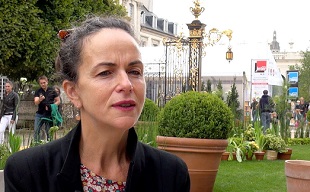
Agnès Desarthe (Parijs, 3 mei 1966)
De Argentijnse dichter Juan Gelman werd geboren op 3 mei 1930 in Buenos Aires. Zie ook alle tags voor Juan Gelman op dit blog.
lament for the death of parsifal hoolig (Fragment)
oh dear ones!
that rain fell years and years on the
pavement of Hereby Street
without ever erasing the slightest trace
of what had happened!
without dampening one of the humili-
ations not even one of the fears
of that man with hips scrambled tossed
in the street
late so his terrors can mix with water
and rot and end!
and so died parsifal hoolig
he closed his silent eyes
kept the custom of not protesting
was a brave dead man
and while his obituary did not appear in
the New York Times and the Chicago
Tribune paid no attention to him
he did not complain when they picked him
up in a truck from the city
him and his melancholy look
and if someone supposes this is sad
if someone is going to stand up and say it
is sad
know this is exactly what happened
nothing else happened but this
under this sky or vault of heaven
Vertaald door Katherine Hedeen en Víctor Rodríguez Núñez
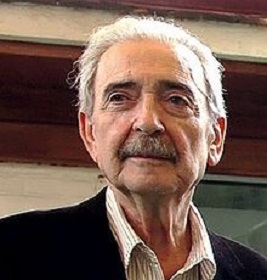
Juan Gelman (3 mei 1930 – 14 januari 2014)
Zie voor nog meer schrijvers van de 3e mei ook mijn blog van 3 mei 2017 en mijn blog van 3 mei 2015 deel 2 en eveneens deel 3.

